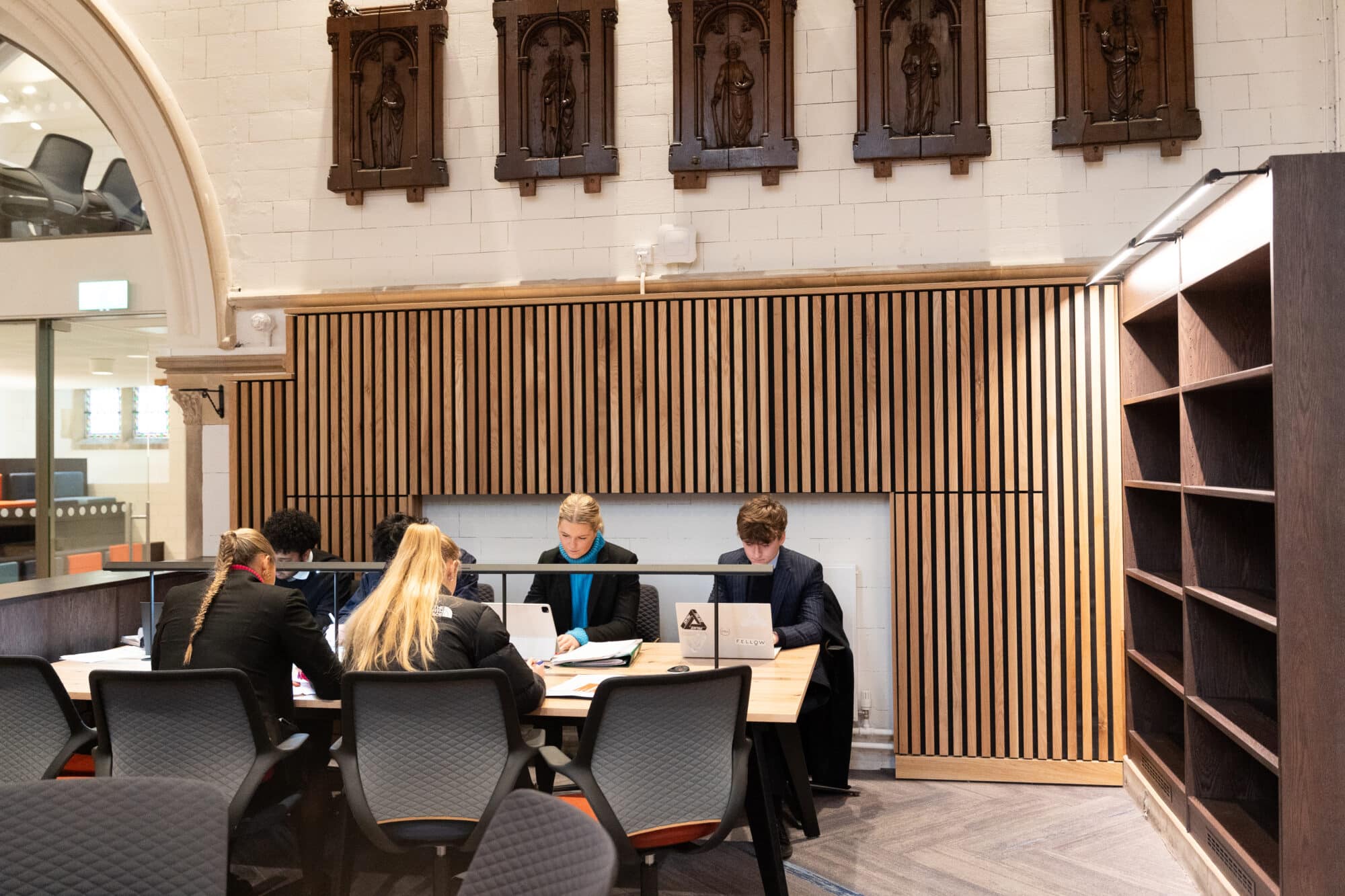The pandemic accelerated the use of digital technology in education, and at Bradfield College we have made great strides in this area over the past few years. We are a certified Microsoft Showcase school, and technology is now used in every classroom.

Much like our wonderful new St Andrew’s Study Centre, our approach to classroom teaching in the digital age blends the traditional and the innovative. Our teachers have the freedom and confidence to employ both technology and traditional teaching techniques to enhance pupil learning in their subject. Our pupils benefit from this blend in three key ways:
They are exposed to different ways of working and learning, allowing them to find techniques which best help them to learn, be that digital or analogue.
They can develop their own processes, equipping them with the digital literacy skills required for success in university study and the world of work.
They are still well-versed in the techniques demanded of them in hand-written public examinations.
Whilst the presence of devices in the classroom provides teachers and pupils with many opportunities, it comes as little surprise that several studies have found that off topic digital distractions impedes academic performance. In addition, the digital behaviour of others can negatively impact the performance of the whole class.
The root problem lies in the fact the pupils who are prone to distraction believe that they can digitally multitask at no cost to their learning. Surveys of university students suggest that digital distractions consumes an average of 19% of their time. If we are to realise fully the benefits of technology in the classroom, we require a solution that both empowers teachers and protects our pupils and their learning.
From September 2024 the College is introducing School Managed Devices for all Faulkner’s pupils. These Dell laptops have been selected after extensive research and trials, and fully meet the required specification for the classroom at a competitive cost. This together with Senso Cloud, a classroom management system, will allow pupils access to technology without the distractions.
Managed devices for your children
The College’s chosen Digital Device Scheme is supported by Class Technology and the Easy4U Service. The device cost (including accidental damage and theft insurance) is funded by parents via either 60 interest-free monthly payments or one off purchase. The Digital Device Scheme means that all pupils will have access to a personal digital device that, used with our learning platforms, will be tailored to their own needs, skills, and curriculum.
What device will my child be using?
The decision of what device each pupil should have has been researched at length. Our priority in determining this has been based on the following principles:
- To enable all pupils to fully access the curriculum.
- To provide value for money, by being durable and having a five year life span.
- To be a two-in-one device so that it can be used as a laptop and tablet.
- To have battery life which can last a full school day.
- To be user friendly to pupils.
The chosen device is a Dell Latitude 3340 2-in-1. We have trialed this device extensively and found it meets all the pupil needs to access the curriculum successfully.
What will this cost?
The cost of the device will be either:
- One off payment of £1,201* including VAT.
- 60 interest-free monthly payments of £20.10* including VAT per month.
- Either option includes insurance and warranty.
* Price for devices supplied September 2024
How will I buy this device?
This will be a simple process facilitated through the Easy4U Portal.
The deadline for placing orders will be Friday 14 June. Once ordered, Easy4U and Bradfield College will do the rest. The device will be ready to go when your child starts in September.
What are the benefits of Easy4u?
- Purchase directly through Easy4U using their website.
- Laptop is delivered directly to the College and our IT will ensure it is up and running ready for your child.
- Hassle free repairs and replacements.
- Insurance and warranty – all wrapped up in the price.
What happens if my child leaves before five years?
If you have paid for the device in full, the device is stripped of all Bradfield College restriction and your child retains the device. If you have paid monthly, you can either pay off the remaining balance and keep the device, or hand back the device to Easy4U (the cost of cancelling the contract is four months payments).
Who owns the device?
The device is owned by your child/you, but is under the management of the College during their time here. Once they leave the College, any restrictions are removed and your child has full control.
Does my child have to have a digital device in school?
Yes, we will be asking every pupil to have a digital device from when they arrive in Faulkner’s.
My child already has a laptop, can they use this rather than the laptop provided through the Digital Device Scheme?
During Faulkner’s, all pupils will be required to use only the devices provided through the Digital Device Scheme. When pupils move into their Senior Houses they will be permitted to have their own laptop or alternative device in the College. However, these will be for personal use outside of lessons and prep.
Is there any financial support available for pupils in receipt of a bursary?
For those pupils in receipt of bursaries, there is support available to help meet the cost of the scheme.
Are digital devices used in all lessons?
Not necessarily. In the blended learning environment, digital devices are one of the many tools available for use in lessons. Teachers will continue to use their professional judgement to choose when the devices are used to enhance teaching and learning based on the topic, content and learning activities. We continue to value the importance of handwriting, speaking and listening, and offline collaborative and practical work. In many cases, devices will be used to record the outcomes of offline work, such as photos, video or audio recordings.
How will the device impact learning activities?
The choice of the Dell Latitude with active stylus means that a wide range of learning activities can be enhanced by the device. This includes the use of voice recording, video, digital inking, collaborative documents, data recording and processing, immediate feedback and accessibility features.
Does this mean that there will be no more physical textbooks and paper resources?
Physical textbooks and paper resources will continue to be used, although the use of these will be gradually reduced as resources will be shared and accessed on devices. Pupils will make notes on Microsoft OneNote and are also able to store digital copies of physical work, this means all work is organised effectively and backed up to the cloud rather than the device itself. This will also have a positive impact on our environmental footprint as a College.
How will this impact on pupil behaviour?
The College has high expectations of online and offline behaviour for all pupils, and we have systems and processes in place to support this while pupils are using devices. We have a high-quality filtering system on all devices and wireless connection from teacher devices to classroom screens.
How will using a device help prepare my child for the world beyond Bradfield?
The ability to thrive beyond their time at Bradfield College is a key component of the education we aim to provide, and technology plays an important role in employability and working practices. We want the pupils to be able to navigate the world outside safely and effectively, and digital literacy is a key component of this. The systems and platforms used in school are used by 95% of UK Universities and businesses, which will help prepare our pupils effectively for their next steps.
Is the Dell Latitude 13 inch screen size suitable for use in classrooms and at home?
One of the key considerations is selecting this device is the size and weight for pupils to carry around in College and this device is both small and lightweight. We have tested the devices with pupils in the College and we are confident they will quickly adapt to the Dell Latitude device.
Can my child charge the device at school?
The Dell device has a good battery life and a fully charged device will last the full school day. On occasions where pupils have forgotten to charge devices there will be provision for charging in classrooms and during break and lunchtimes.
What happens if the device is lost, damaged or stolen?
Devices purchased through the Digital Device Scheme are fully covered and you will have the option to inform the insurance company or to request the College manage this process. There is a £50 excess on each claim. The insurance covers three accidental damage repairs over the five year plan. (These devices are outside of the College’s personal effects policy).
Will the college provide support with the device?
Yes, our onsite IT Team can support the devices.
Ensuring we minimise distractions
The final step we are taking to ensure we minimise distractions, facilitated by the provision of devices managed by the College, is to put a Classroom Management platform called Senso Cloud on all devices. Senso Cloud is considered the market leader in this space and will support teachers to manage digital distractions.
Senso Cloud relies on a small pieces of software known as a ‘client’ being installed on each pupil device. The client will be remotely installed on all pupil devices. Once installed, teaching staff will be able to manage a device remotely using a browser based platform.

What does the software do?
Senso Cloud works seamlessly with Microsoft Teams. Once logged in, teaching staff will be presented with a list of the class Teams of which they are currently ‘owners’ (i.e a list of classes that they teach). Upon selecting a class, teachers will be able to perform the following actions for all devices in the class:
- View a live image of the devices’ screen
- Lock the device
- Restrict the browser to a particular website
- Limit the device to one or more applications (e.g. OneNote)
These functions will allow staff to monitor pupils’ devices in real-time, minimising pupil distraction and enhancing teaching and learning outcomes.
What does the software not do?
Senso Cloud does not allow staff to take control of a pupil device, nor does it allow them to take a recording of pupils’ screens. No internet or device activity is logged as a result of having the client installed on a device.
When can teaching staff access the software?
Teaching staff will only able to access the software from within the College’s network during term time, and during the academic day.
How will teaching staff use the software?
We are training all staff to use this software. Underpinning this training is the mantra that this is about device management not device monitoring. It is not about trying to ‘catch pupils out.’ Staff will be instructed that they should be using the software to minimise pupil distractions and enhance teaching and learning outcomes in lessons. They will be shown how to use the software to best effect while adopting this approach, namely by restricting pupil devices to the applications they wish them to use in that lesson. For example, by restricting the pupil devices to OneNote, they become a true digital exercise book without any potential for distractions.
What about my child’s privacy?
Explicit training will be been given to staff on the privacy issues associated with this software. Under no circumstance should staff seek to access it outside of their timetabled lesson times with a class, both to protect themselves and to respect the privacy of our pupils. Staff will also been made aware that a click-log of all their activity on the software is maintained by our IT department.
Can staff access the software during prep time?
HsMs may manage individual pupil devices during evening prep should a pupil be failing to make effective use of their prep time.
Can staff manage my child’s personal device?
No. Staff will only be able to manage devices on which the client has been installed.
Does a device have to be connected to the College's network for it to be managed?
Any device on which client software has been installed will be able to be managed, irrespective of the network to which it is connected. We will ensure that pupils are informed that their device could be managed should they be at home or out of lessons during the school day during term time. This will only apply in lesson times.
Will pupils know when a teacher is managing their device?
The software does not alert pupils if their device is being managed, unless it has been locked to particular websites or applications. They will, however, be fully informed about our approach to this software.
What information is passed to Senso?
Prior to the adoption of this software, a comprehensive Data Protection Impact Assessment was completed to ensure the privacy of our pupil data. No pupil internet or device usage is sent to Senso.
How will this software work with existing filtering and monitoring software?
As outlined above, the Classroom Management software will not record internet or device activity. The College already uses the Fortinet suite of tools to meet the latest UK Government standards for filtering and monitoring in schools. These standards require all schools to block harmful and inappropriate content, without unreasonably impacting teaching and learning, and to ensure there are effective monitoring strategies that meet the safeguarding needs of the setting. Fortinet is a member of the IWF (since 2007), signed up to the CTIRU and block access to illegal content.
This platform:
- Filters and records all College internet traffic, including mobile and app content.
- Is applied to all users, including guest accounts, and to all devices using the College’s internet connection.
- Identifies and blocks VPNs and proxy avoidance services.
- Provides alerts when a user has content blocked, and records the device name, IP address, username, the time and date of attempted access, and the search term or content blocked.
- Compiles a weekly report of blocked or ‘risky’ search terms which is reviewed by the DSL and followed up as appropriate.
- The Digital Strategy Group review the filtering settings on an annual basis, ensuring the blocklists are age appropriate.



